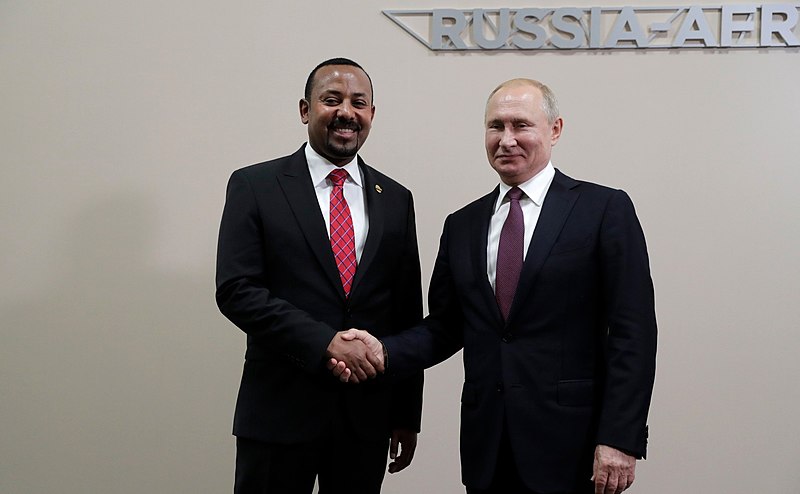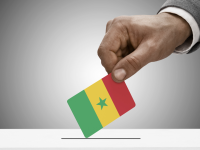A Day of High Anticipation Today marks a momentous occasion in Senegal as citizens gather…

The West VS Russia clash moves to Ethiopia. Italian economic interests at risk
The current clash between Russia and the West of which Ukraine is the dramatic epicenter is moving to Ethiopia. Moscow will increase its political, economic and military support to the nationalist Amhara regime causing an extension of the conflict a thousand times worse than the Ukrainian one. Italy, which has also focused on the Amhara leadership, which is increasingly becoming Nazi-fisted, is at risk.
On Monday 21 March, the Russian Ambassador to Ethiopia, Evgeny Terekhin, during a visit to the capital of the Amhara region: Bahir Dar, reaffirmed his country’s commitment to supporting the Ethiopian totalitarian regime and especially the nationalist Amhara leadership. As a concrete gesture of support there is the promise to allocate funding (currently not quantified) for the reconstruction of the infrastructures of the Amhara region destroyed during the ongoing conflict that began on November 4, 2020.
Terekhin also hinted at collaborations with higher education institutions in the region for human resource development. A first agreement has been signed with the University of Bahir Dar for urban development studies.
During the press conference, the Russian ambassador repeatedly accused the defense forces of Tigray and Mekelle government of the TPLF (Tigray People’s Liberation Front) of being the cause of the destruction and grief that the Amhara region has suffered during the past 17 months, calling the TPLF a terrorist organization. No mention has been made of the destruction of infrastructure, the siege and the embargo of humanitarian aid to Tigray which are part of a blatant strategy of ethnic genocide.
A crime against humanity aimed at eliminating a dangerous political-military enemy which represents, together with the armed opposition in Oromia, the main obstacle for the Amhara nationalism project to establish ethnic domination in Ethiopia, along the lines of the imperial domination started in 975 AD by Emperor Menelik I who founded the Solomonic dynasty of Ethiopia and ended 225 generations later, with the deposition of the last Amhara emperor: Tafari Makonnen Haile Selassie I in 1974.
The administrative manager of the Amhara region: Yilkal Kefale, a well-known nationalist hawk and a staunch supporter of the genocide taking place in Tigray, expressed gratitude to the Russian government for having been on the side of Ethiopia during the various difficult moments of the conflict of which the its end is still far away.
“Russia is a country that stands alongside Ethiopia in the face of international challenges. During the various sessions held by the United Nations Security Council to interfere in the internal affairs of Ethiopia, Russia recognized the truth of the government by supporting it in the war of survival of our country threatened by terrorist groups supported by Western imperialism “he pompously and blatantly affirmed Yilkal Kefale
Support for the nationalist Amhara regime was reiterated by the Russian ambassador during a meeting with the deputy mayor of Bahir Dar, Dire Sahlu. The ambassador promised to the deputy mayor Russia’s support for working with the Amhara regional state on any development cooperation and said the region may request the support and cooperation it needs.
Russia-Ethiopia relations date back to 1890 when the military support of Tsarist Russia was decisive in defeating the attempted colonial conquest of Ethiopia carried out by Italy, which disastrously ended on 01 March 1896 with the defeat of the Italian troops at Adwa which put an end to Italy’s colonial ambitions in the Horn of Africa.
Russia and Ethiopia are both ancient empires with different populations subjected for centuries by central and totalitarian powers, the Tsarist and the Amhara. The two countries also share the Orthodox identity. For the least two centuries the Ethiopian and Russian Orthodox churches have been closely linked by a common vision of the Christian faith.
Relations with Ethiopia strengthened during the period of the “red terror” of the DERG military junta led by the ferocious Ethiopian dictator Mengistu Haile Mariam where the Soviet Union imposed Stalin’s communist model. Following the fall of the regime in 1991 by the TPLF and the Oromo Liberation Army – OLA, relations with Russia entered into crisis as the democratic federalist forces preferred to move towards the European Union and the United States.
Since the TPLF and the OLA are the same forces that are currently fighting to liberate the country, the alliance with the nationalist Amhara regime is in fact a mandatory act to protect Moscow’s interests in the Horn of Africa and, in general, in Africa.
For Moscow, the TPLF represents a mortal enemy as it blocked Russian influence in the country for almost 30 years, becoming a preferred ally of the United States, guaranteeing Washington’s strong control over the Horn of Africa region and the Red Sea, thanks to an economic and military development policy that had transformed Ethiopia into a pro-Western regional power.
During Ambassador Terekhin, visit to Bahir Dar no indiscretions were leaked to the Russian military support formalized in the military cooperation agreement between the two countries signed in 2018. Since the beginning of the conflict, Russian military support to the nationalist Amhara regime has been limited to the supply of weapons and ammunition, resulting significantly below to the support received from other international allies: China, United Emirates, Iran, Turkey. In the face of the planetary challenges imposed by the war in Ukraine, this military support could now drastically increase.
The advent of Premier Abiy Ahmed Ali (ironically wanted and supported by the TPLF itself in 2018) has opened up spaces for economic penetration and geopolitical influence for both Russia and China. In less than two years, Moscow has significantly increased military and economic cooperation with Ethiopia, considered a strategic country due to its influence in Africa. From being an ally of the first order, Ethiopia under nationalist Amhara rule has become a source of grave concern for the United States and the European Union which have proved unable to deal with the strategic threat from Moscow and Beijing.
When the nationalist Amhara leadership, which effectively controls the Ethiopian Premier Abiy, made an alliance with the Eritrean dictator Isaias Afwerki (another first order ally of Moscow and Beijing), starting the war against Tigray and Oromia, United States has activated the political and military support of its ally: the TPLF by extending it to the Oromo Liberation Army, transforming the Ethiopian conflict into a proxy war against the emerging Chinese and Russian imperialism.
Russia’s original intentions for Ethiopia now take on new meaning in light of Putin’s war on Ukraine. A defensive conflict against the US-led project to encircle Russia through NATO, which has intensified the gap between Russia and the West, causing significant economic decoupling between the parties.
The war in Ukraine has triggered the escalation of the regional dispute between Russia and the West which has spread to Ethiopia and which seems destined to spread to the entire African continent. The Kremlin sees the strengthening of its ambitions in the Horn of Africa region, in terms of conflict with the West in which the civil war in Ethiopia becomes the nerve center of the dispute.
In the new strategic vision that Russia has adopted since it launched its full-scale invasion of Ukraine, political and military support for the nationalist Amhara regime takes top priority as the Ethiopian civil war becomes part of a concerted Moscow effort to deal with Western sanctions. Ethiopia, together with Burundi, Eritrea, Mali and the Central African Republic, becomes one of the Russian bastions on the continent to strengthen control over rare and precious African minerals. For example, the extraction of gold, diamonds and rare minerals is present in all recent Russian expansions in Africa.
According to various international experts, including Thedore Murphy, director of the Horn of Africa and the Red Sea of the European Council for Foreign Relations, Russia could use Ethiopia as an alternative battleground to weaken the United States and the European Union. This new theater of confrontation could take the form of a permanent instability capable of shifting the attention of the Western Allies in the Horn of Africa and dividing the member states of the European Union on which region to prioritize and which alliances to strengthen to resolve at their own favor the Ethiopian civil war.
The main dividing factor of the EU in the strategy in the Horn of Africa is played by Italy which has been attempting an independent policy in the region since 2018 aimed at strengthening national economic interests and the sale of arms which is becoming an immoral but really profitable engine of Italian economic development.
This independent policy, promoted without shame and reservations by Premier Draghi, and the operetta politicians of the Farnesina: Luigi di Maio (called gigino) and Marina Sereni, is based on the unconditional support of the Eritrean dictator Isaias Afwerki and the nationalist Amhara leadership of Addis Ababa in which extremist parties clearly oriented towards Nazism are emerging with arrogance such as the National Movement of Amhara (NAMA) and the Amhara National Democratic Movement (ANDM) of Gedu Andargachew who defines himself an admirer of Hitler and of the final solution against the Jews to be applied in Ethiopia against the Tigers and the Oromo.
The increase in Moscow’s political and military support for the primitive and barbaric Amhara regime which now orders its soldiers to burn alive Tigrinya prisoners of war and civilians in Oromia, will inevitably take on a connotation of direct confrontation with Italian interests in the country and in the Horn of Africa.
Italian government, whose morality and political capacity are increasingly questionable, will soon find itself facing the dilemma of accepting in Ethiopia a role subordinate to Moscow and Beijing economic imperialisms or whether to think of a total upheaval of its foreign policy in the region of Horn of Africa in line with the holy war declared on Russia, under the diktat of the United States.
The efforts carried out by Italian politicians (Draghi, Di Maio, Sereni) lacking a vision of promoting long-term national interests who have renounced the fundamental values of the European Union such as the defense of democracy and human rights for the sole purpose of favoring an handful of “filibuster” Italian companies and the national war industry now risk being annihilated by Russia if Italy will be forced to respect the secret ties that characterize the Atlantic Pact signed with the Allies by Italy in 1949 as a nation defeat in the Second World War.
If the Italian government will be forced by the United States and the European Union to enter into open conflict with Russia in the Horn of Africa, the nationalist leaders Amhara and the Eritrean dictator Isaias Afwerki, known for their political pragmatism, will not hesitate a single moment to prefer Russian superpower to a shaky and incoherent state such as Italy. An Italian rethinking of alliances in Ethiopia will be made very difficult due to the immoral choices made by Italian government since the beginning of the Ethiopian conflict.
Tigray and Oromia democratic forces, characterized by a linear and proud mentality and culture, will not forget Italy’s alliance with fanatical extremists who aim at ethnic domination through the destruction of an entire ethnic group (in Tigray) and submission through violence and terror of over 42 million Ethiopian citizens in Oromia …
Little Italy’s choices from 2018 to today risk giving Italy a second and worse defeat than Adwa in Ethiopia. As happened in 1890, Russia could be the main factor in the end of the Italian colonial aims in the Horn of Africa.





